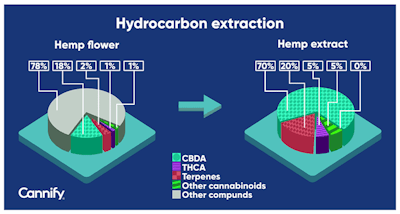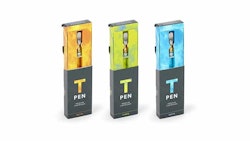
Dr. Linda Klumpers, founder of cannabis research and education organization, Cannify, is on a mission to provide objective, science-based cannabis education to dispensaries and their customers.
Klumpers and her team have developed a science-based algorithm that generates a personalized report for medical cannabis patients with data from relevant cannabis studies to help match patients with a list of relevant products for their preferences and personal characteristics.
The algorithm is presented in the form of a questionnaire, which dispensaries can offer patients through a widget on their websites or in-store tablets. Once a patient submits a completed questionnaire, they can browse through Cannify’s growing database of more than 1,500 items to see which products are relevant for them. They can even save the products they like for future reference.
“That … solves a lot of questions, such as, is there any study that shows whether Tourette’s can be helped with a cannabis product? We will give an overview of the scientific literature and a narrative that explains whether a therapeutic effect was found or not,” Klumpers tells Cannabis Dispensary. “After one fills in the questionnaire and gets the first report, there is a translation with algorithms to product matches, so you can see how closely a product could be related to the summary of literature findings.”
This kind of education and support is key, she adds, because some patients might not know the difference between THC and CBD, for example, or how oral forms of cannabis might affect the body differently than a vape cartridge. Klumpers says it is also important to note that there is a huge difference between pharmaceutical products versus medical or recreational cannabis—something that is not always realized as “medical” sounds very medical and therefore is often perceived as products that have been actually tested in clinical studies, whereas they typically have not.
Customers can print or save on a mobile device the overview of the products they are interested in and the reports that they’ve generated, and take this information with them to the dispensary, which ultimately increases efficiency at the store by shortening the amount of time budtenders spend with each customer.
Another way that Cannify can help dispensaries’ day-to-day operations is by providing analytics based on its questionnaires, Klumpers adds.
“[Dispensaries] know things about their customers because they have their phone number, or they get some sales data … but we provide very different insight into the analytics because we know way more about the customers’ demographics, the customers’ wants and their needs,” she says.
The Cannify platform also allows dispensaries to customize the products that are shown to customers, narrowing them down from all products available in the U.S. to only items offered at a particular store.
One of Cannify’s clients, a dispensary chain in Western Colorado, has taken a unique approach to the questionnaires, and has turned them into a promotional tool, Klumpers says. Through text message marketing, the dispensary sends educational quizzes to customers enrolled in the loyalty program, and those who receive a certain score can enter a raffle to win products, for example.
Cannify also creates its own educational content that dispensaries can place on their websites, and it has launched educational courses for both budtenders and consumers.
“There are so many characteristics of the human [body that] respond to different products,” Klumpers says. “[Consumers and budtenders] can’t know everything that people have studied for a long time, so we try to help them.”

Klumpers holds a Ph.D. in the clinical pharmacology of cannabinoids from Leiden University in the Netherlands and has been studying cannabinoids for more than 14 years. While she spearheads much of Cannify’s educational content, she relies on a team of scientists, educators, clinicians and writers to keep the process running smoothly.
Cannify gleans its content primarily from hundreds of studies that have been published in peer-reviewed literature, Klumpers says, but it also bases some of its algorithms in Cannify’s questionnaires on raw data from universities and other research institutions.
“If you put all the data from the studies together, you actually can extract some helpful information that can be significant,” she says, which includes customer demographics and how they compare to other stores in Cannify’s database, reasons why customers consider using cannabis products, which specific products customers actually end up using, and feedback on the products they have tried.
Cannify launched in 2016 and unveiled the newest version of its web widget this year, after nearly a year of testing.
Although the widget is still fairly new, Cannify has received mostly positive feedback from dispensaries, who are largely in favor of the educational opportunities, Klumpers says.
“I think we really know what we’re doing,” she says. “When people try it, they really, really like it.”
Klumpers and her team are working to build out additional features for budtenders and dispensaries, including additional analytics and more robust, real-time data. Cannify is also looking to unveil a new feature that would allow dispensaries to compare which products customers viewed online versus what is available in-store, which can help retailers make more informed decisions regarding new product development and product selection.
“We are working on [making] the interaction between the customer and the dispensary way easier, all based on science and customizable to the preferences of the dispensary, of course,” Klumpers says.

























